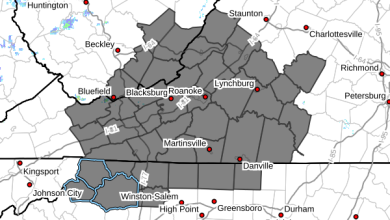Last Updated on February 13, 2018 3:31 pm
Visitors must:
Be 18 years or older
Be healthy and not have the flu or influenza-like illness
Not live with anyone who has been diagnosed with the flu or influenza-like illness
The medical team may make exceptions on a case-by-case basis for siblings of newborn babies and families of hospice or end of life patients.
“For the health and safety of our patients and residents, we must restrict visitation,” stated Dr. Danielle Mahaffey, Chief Physician Executive for Appalachian Regional Healthcare System. “Flu cases have almost reached pandemic levels. We need the community's help to stop the spread in the High Country.”
According to the Centers for Disease Control, seasonal flu activity continues to rise in the U.S. The proportion of people seeing their healthcare provider for influenza-like illness continues to increase and has been at or above the national baseline.
Flu viruses spread mainly from person to person through coughing or sneezing. Sometimes an individual may catch flu by touching an object infected with the virus and then touching the eyes, mouth, or nose. Listed below are several things you can do to prevent catching or spreading the flu.
Wash your hands often with soap and water, especially after you cough or sneeze. Alcohol-based hand cleaners are also effective.
Avoid touching your eyes, nose or mouth. Germs spread this way.
Try to avoid close contact with sick people.
Cover your nose and mouth with a tissue when you cough or sneeze. Throw the tissue in the trash after you use it.
If you don't have a tissue, cough or sneeze into your upper sleeve, not into your hands.
If you get sick with flu, stay home from work or school and limit contact with others to keep from making them sick.
Get the recommended seasonal flu vaccine.
Recognizable Symptoms Include:
Fever
Cough
Sore throat
Body aches
Chills
Fatigue
Runny or stuffy nose
Headache
Diarrhea
Vomiting
Most people recover from flu after about a week without lasting effects.
Seek emergency medical care if you or a family member has any of these symptoms:
Difficulty breathing or shortness of breath
Pain or pressure in the chest or abdomen
Sudden dizziness
Confusion
Severe or persistent vomiting
Flu-like symptoms that improve, but then return with fever and worsening cough
In babies, bluish or gray skin color, lack of responsiveness or extreme irritation
Appalachian Regional Healthcare System is working diligently to prevent the spread of flu and appreciates any assistance the public can provide. For more information about the flu, visit www.flu.gov/ or www.cdc.gov/flu.
















